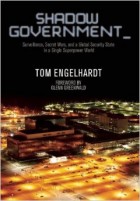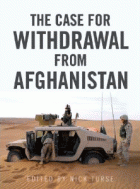They are the outposts of empire. They have been or are being built in countries across the world from Indonesia to Dubai, India to Uruguay, South Korea to Qatar, the Philippines to Turkey, and in the future possibly, from Saudi Arabia to Egypt. They represent a staggering imperial presence for the American commander-in-chief -- oh, and just in case you’re confused, no, I’m not talking about the hundreds of U.S. military bases that dot the planet. I’m thinking about all the towers, elite golf courses, clubs, hotels, condos, and residences that already sport, or in the future will sport, those five gaudy, golden letters that spell TRUMP in countries that circle the globe. They, too, are indeed the outposts of empire, a business one that still belongs to the commander-in-chief. And keep in mind that, if you’re thinking imperially in a truly twenty-first-century American fashion, you also need to include the businesses represented by Ivanka Trump and her husband, Jared Kushner, both now key White House advisers.
In our present moment, it’s worth recalling what Charles Wilson, the CEO of General Motors (then the country’s largest defense contractor), so classically said back in 1953 at his Senate confirmation hearings. President Dwight Eisenhower had nominated him for secretary of defense and various senators were challenging him for refusing to sell his GM stock. (After the president requested that he do so, and he did, he was immediately confirmed.) Asked about whether he would be capable of making a decision in the national interest as secretary of defense if it had “extremely adverse” consequences for the company, he responded, “Yes, sir, I could. I cannot conceive of [such a conflict, however,] because for years I thought what was good for the country was good for General Motors and vice versa.”
If once upon a time that was taken as a classic statement of corporate crassness, tell me that, in the shadow of the Trump White House and what are still politely referred to in the media as its “conflicts of interest,” it doesn’t now seem like a quaintly principled, almost patriotic thing to say. Or let me propose something else: read today’s account by TomDispatch regular Nomi Prins, author of All the Presidents' Bankers, of what family time’s like in the Trump Oval Office and then tell me whether Wilson’s statement doesn’t seem like the good old days to you. Tom
The Empire Expands
Not the American One, But Trump’s
By Nomi PrinsPresident Trump, his children and their spouses, aren’t just using the Oval Office to augment their political legacy or secure future riches. Okay, they certainly are doing that, but that’s not the most useful way to think about what’s happening at the moment. Everything will make more sense if you reimagine the White House as simply the newest branch of the Trump family business empire, its latest outpost.
It turns out that the voters who cast their ballots for Donald Trump, the patriarch, got a package deal for his whole clan. That would include, of course, first daughter Ivanka who, along with her husband, Jared Kushner, is now a key political adviser to the president of the United States. Both now have offices in the White House close to him. They have multiple security clearances, access to high-level leaders whenever they visit the Oval Office or Mar-a-Lago, and the perfect formula for the sort of brand-enhancement that now seems to come with such eminence. President Trump may have an exceedingly “flexible” attitude toward policymaking generally, but in one area count on him to be stalwart and immobile: his urge to run the White House like a business, a family business.
[Note for TomDispatch Readers: The next post will appear on Tuesday, May 2nd. Tom]
If you’re a reader of TomDispatch, then you know something of real importance about this country that most Americans don’t. As an imperial power, there’s never been anything like the United States when it comes to garrisoning this planet. By comparison, the Romans and imperial Chinese were pikers; the Soviet Union in its prime was the poorest of runners-up; even the British, at the moment when the sun theoretically never set on their empire, didn’t compare. The U.S. has hundreds of military bases ranging in size from small American towns to tiny outposts across the planet, and yet you could spend weeks, months, years paying careful attention to the media here and still have no idea that this was so. Though we garrison the globe in a historically unprecedented way, that fact is not part of any discussion or debate in this country; Congress doesn’t hold hearings on global basing policy; reporters aren’t sent out to cover the subject; and presidents never mention it in speeches to the nation. Clearly, nothing is to be made of it.
It’s true that, if you're watching the news carefully, you will find references to a small number of these bases. In the present Korean crisis, for instance, there has been at least passing mention of Washington’s bases in South Korea (and the danger that the American troops on them might face), though often deep in articles on the subject. If, to pick another example, you were to read about the political situation in Bahrain, you might similarly find mentions of the U.S. base in that small Gulf kingdom that houses the Navy’s Fifth Fleet. Generally, though, despite the millions of Americans, military and civilian, who have cycled through American bases abroad in recent years, despite the vast network of them (the count is now approximately 800), and despite the fact that they undergird American military policy globally, they are, for all intents and purposes, a kind of black hole of non-news. Don't even think to ask just why the U.S. garrisons the planet in this fashion or what it might mean. It would be un-American of you to do so.
I must admit that, until I met Chalmers Johnson back at the turn of the century, I was a typical American on the subject. I never gave much thought to what he called our “empire of bases.” My own shock on grasping the nature of this country’s highly militarized presence across this planet led me to decide that, at least at TomDispatch, American basing policy would get some of the attention it obviously deserves. This initially happened thanks to Johnson himself; later to David Vine, author of a rare book, Base Nation, on the subject; and finally to this site’s own Nick Turse, who in recent years has been following the U.S. military’s global basing policy as it moved onto the rare continent that had largely lacked them: Africa. No longer. Today, he offers his latest update on the burgeoning set of bases and outposts that the U.S. military has been building or occupying and expanding there without notice, discussion, or debate, a network that will ensure we are plunged into the spreading terror wars on that continent for decades to come. Tom
America’s War-Fighting Footprint in Africa
Secret U.S. Military Documents Reveal a Constellation of American Military Bases Across That Continent
By Nick TurseGeneral Thomas Waldhauser sounded a little uneasy. “I would just say, they are on the ground. They are trying to influence the action,” commented the chief of U.S. Africa Command (AFRICOM) at a Pentagon press briefing in March, when asked about Russian military personnel operating in North Africa. “We watch what they do with great concern.”
And Russians aren’t the only foreigners on Waldhauser’s mind. He’s also wary of a Chinese “military base” being built not far from Camp Lemonnier, a large U.S. facility in the tiny, sun-blasted nation of Djibouti. “They’ve never had an overseas base, and we’ve never had a base of... a peer competitor as close as this one happens to be,” he said. “There are some very significant... operational security concerns.”
From his “big, fat, beautiful wall” to his travel bans, much of Donald Trump's push to isolate America, like so much else in his program, has hit a series of ugly speed bumps. Not only won’t the Mexicans “pay” to build that much-promised wall, but even Congress is unlikely to do so, as its price tag soars by the week. Of course, much of what Trump wants to do when it comes to keeping “them” out, or throwing “them” out, has (as TomDispatch regular Aviva Chomsky writes today) already been done. Our last president wasn’t given the moniker of “deporter-in-chief” by his critics for nothing, and as for that wall, a far more sophisticated, layered version of it is already in place, complete with advanced sensors, cameras, drones, biometrics, spy towers, radar systems -- much of the technology tested on America’s distant battlefields -- as well as actual walls. Even if there isn’t a single old-fashioned wall along the full length of the U.S.-Mexican border, the construction of the layered “wall” that does exist began in the years of Bill Clinton's presidency and its expansion has continued in a bipartisan fashion ever since.
And yet, even if Donald Trump never builds his wall, his attitude, whether toward Mexicans or Muslims, and the spirit of nativism and authoritarianism he’s released in those who police and bureaucratically control America’s borders, along with a bully-boy language that relies on phrases like “extreme vetting” and on demands to turn over personal passwords for electronic equipment at the border, will go a significant way toward walling this country in. Take tourism. Just the other day, Dubai’s government-owned airline, the largest in the Middle East, announced that it was significantly cutting back on its flights to the U.S. because interest among its customers had fallen radically and bookings were way down. (“The recent actions taken by the U.S. government relating to the issuance of entry visas, heightened security vetting, and restrictions on electronic devices in aircraft cabins, have had a direct impact on consumer interest and demand for air travel into the U.S.”)
But it isn’t just Mexicans and Muslims, the obvious targets of Trump’s banning efforts and other restrictive urges, who are losing their urge to travel here; it's true, too, of Asians and Europeans. According to travel companies, interest in voyaging to America, whether for vacation or business, is down across the planet. Searches for flights to the U.S. have, for instance, dropped by 13% in Great Britain, 35% in New Zealand, and 40% in China. Twenty-nine percent of Britons recently claimed that they were far less eager to holiday in America. (Globally -- go figure -- only Russian interest seems to be up.) And if, as Secretary of Homeland Security John Kelly has warned, the present visa-less travel from most European countries comes into question, watch out.
Already, it seems clear that tourism to the U.S. has taken a genuine hit -- a drop, reports the Bureau of Economic Analysis, of 10.2% for last December, January, and February. According to Tourism Economics, 4.3 million visitors will decide not to come to the U.S. this year, a potential loss of $7.4 billion, and in 2018 those figures might rise to 6.3 million and $10.8 billion. (The “Trump slump” in tourism already underway will obviously also mean lost jobs for the jobs president.)
And don’t forget that, as with America’s wars, so with the walling in of America, there’s a distinct history here for President Trump to build on and, as Aviva Chomsky writes today, it’s a history that is remarkably, dismally bipartisan. Tom
Making Sense of the Deportation Debate
How Bill Clinton and Barack Obama Laid the Groundwork for Trump’s Immigration Policies
By Aviva ChomskyEver since he rode a Trump Tower escalator into the presidential race in June 2015 and swore to build his “great wall” and stop Mexican “rapists” from entering the country, undocumented immigrants have been the focus of Donald Trump’s ire. Now that he’s in the Oval Office, the news has been grim. A drumbeat of frightening headlines and panicked social media posts have highlighted his incendiary language, his plans and executive orders when it comes to immigrants, and the early acts of the Border Patrol and U.S. Immigration and Customs Enforcement agents when it comes to round-ups and deportations. The temperature has soared on the deportation debate, so if you think we’re in a completely unprecedented moment when it comes to immigration and immigrants, you’re in good company.
[Note for TomDispatch Readers: The other day, one of my favorite writers, Ariel Dorfman, dropped me a line to tell me that he had just finished Pulitzer-Prize-winning historian John Dower’s new Dispatch Book, The Violent American Century: War and Terror Since World War Two, and had promptly bought three more copies for family and friends. Here, in fact, is part of what he wrote me: “Last night I finished the book, which is so important, such essential reading... There is much in it that I knew, and quite a bit that I vaguely remembered, and some that I had never assimilated, but to have all that information in one short text, expertly woven and explained, is a devastating indictment of American violence and its imperial hubris. The footnotes alone are more than worth the price (which is very low, especially if we compare it to a Tomahawk missile). It is really like a mini-encyclopedia of American expansionism, but written with the verve of a political thriller, and with the murderer being chased and nailed down step by misstep. I told you many years ago how much I admired his book War Without Mercy when you recommended it to me, and this book simply adds to that admiration, with this additional comment: The Violent American Century has a chance to affect at a massive level our understanding of the world we live in, the one that America has shaped but has been unable to dominate. At a time when the military has taken over the national government -- not to mention the industrialists -- I am grateful to have Dower’s fierce intelligence on our side. Let’s hope it gets the readership it deserves”
Now, honestly, if you can read that and not buy a copy... well, I’m puzzled by you. Remember that you can pick up the book by clicking here or by going to the website of Haymarket Books at this link, where it's available at an exclusive TomDispatch discount of 50% off. In either case, you’ll get an instant classic, short enough to read in a single night, and you’ll lend TD a little extra support in the bargain. Note that, for those of you who want a signed copy of the book, there will be a TD offer (in return for a $100 contribution to the site) in a couple of weeks when I’ll be posting an original piece by Dower. Tom]
The Honeymoon of the Generals
Or Why Trump’s Wars Should Seem So Familiar
By Tom Engelhardt
MOAB sounds more like an incestuous, war-torn biblical kingdom than the GBU-43/B Massive Ordnance Air Blast, aka “the mother of all bombs.” Still, give Donald Trump credit. Only the really, really big bombs, whether North Korean nukes or those 21,600 pounds of MOAB, truly get his attention. He wasn’t even involved in the decision to drop the largest non-nuclear bomb in the U.S. arsenal for the first time in war, but his beloved generals -- “we have the best military people on Earth” -- already know the man they work for, and the bigger, flashier, more explosive, and winninger, the better.
It was undoubtedly the awesome look of that first MOAB going off in grainy black and white on Fox News, rather than in Afghanistan, that appealed to the president. Just as he was visibly thrilled by all those picturesque Tomahawk cruise missiles, the equivalent of nearly three MOABS, whooshing from the decks of U.S. destroyers in the eastern Mediterranean and heading, like so many fabulous fireworks, toward a Syrian airfield -- or was it actually an Iraqi one? “We've just fired 59 missiles,” he said, “all of which hit, by the way, unbelievable, from, you know, hundreds of miles away, all of which hit, amazing... It's so incredible. It's brilliant. It's genius. Our technology, our equipment, is better than anybody by a factor of five.”
Call it thrilling. Call it a blast. Call it escalation. Or just call it the age of Trump. (“If you look at what’s happened over the last eight weeks and compare that really to what’s happened over the past eight years, you’ll see there’s a tremendous difference, tremendous difference,” he commented, adding about MOAB, “This was another very, very successful mission.”)
Anyway, here we are and, as so many of his critics have pointed out, the plaudits have been pouring in from all the usual media and political suspects for a president with big enough... well, hands, to make war impressively. In our world, this is what now passes for "presidential." Consider that praise the media version of so many Tomahawk missiles pointing us toward what the escalation of America’s never-ending wars will mean to Trump’s presidency.
There are the terrorists, who get attention out of all proportion to their actual clout, and then there are those with big-time clout -- I think of them as the terrarists -- who get almost no attention at all. Back in May 2013, I came up with that term and here’s how I described those I thought it should apply to:
“We have a word for the conscious slaughter of a racial or ethnic group: genocide. And one for the conscious destruction of aspects of the environment: ecocide. But we don’t have a word for the conscious act of destroying the planet we live on, the world as humanity had known it until, historically speaking, late last night. A possibility might be ‘terracide’ from the Latin word for earth. It has the right ring, given its similarity to the commonplace danger word of our era: terrorist.
“The truth is, whatever we call them, it’s time to talk bluntly about the terrarists of our world. Yes, I know, 9/11 was horrific. Almost 3,000 dead, massive towers down, apocalyptic scenes. And yes, when it comes to terror attacks, the Boston Marathon bombings weren’t pretty either. But in both cases, those who committed the acts paid for or will pay for their crimes.
“In the case of the terrarists -- and here I’m referring in particular to the men who run what may be the most profitable corporations on the planet, giant energy companies like ExxonMobil, Chevron, ConocoPhillips, BP, and Shell -- you’re the one who’s going to pay, especially your children and grandchildren. You can take one thing for granted: not a single terrarist will ever go to jail, and yet they certainly knew what they were doing.”
Almost four years later, there’s a new set of names to be added to the ranks of those terrarists, including Donald Trump, Scott Pruitt, Rex Tillerson, and every climate-change denialist and energy-company aider and abettor now in the ranks of the U.S. government. And almost four years later, as TomDispatch regular Michael Klare points out, the early evidence of what their dystopian crimes will mean on a planetary scale is on display in Africa and Yemen -- and it couldn’t be grimmer.
In 2013, I concluded: “To destroy our planet with malice aforethought, with only the most immediate profits on the brain, with only your own comfort and wellbeing (and those of your shareholders) in mind: Isn’t that the ultimate crime? Isn’t that terracide?” Read Klare’s piece, think about the greenhouse gases that will be pumped into the atmosphere in prodigious amounts in the Trump years, and tell me that we’re not talking about the greatest crime of this or any other century and, even among the worst butchers of history, potentially the greatest criminals of all time. Tom
Climate Change as Genocide
Inaction Equals Annihilation
By Michael T. KlareNot since World War II have more human beings been at risk from disease and starvation than at this very moment. On March 10th, Stephen O’Brien, under secretary-general of the United Nations for humanitarian affairs, informed the Security Council that 20 million people in three African countries -- Nigeria, Somalia, and South Sudan -- as well as in Yemen were likely to die if not provided with emergency food and medical aid. “We are at a critical point in history,” he declared. “Already at the beginning of the year we are facing the largest humanitarian crisis since the creation of the U.N.” Without coordinated international action, he added, “people will simply starve to death [or] suffer and die from disease.”
Major famines have, of course, occurred before, but never in memory on such a scale in four places simultaneously. According to O’Brien, 7.3 million people are at risk in Yemen, 5.1 million in the Lake Chad area of northeastern Nigeria, 5 million in South Sudan, and 2.9 million in Somalia. In each of these countries, some lethal combination of war, persistent drought, and political instability is causing drastic cuts in essential food and water supplies. Of those 20 million people at risk of death, an estimated 1.4 million are young children.





















